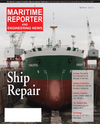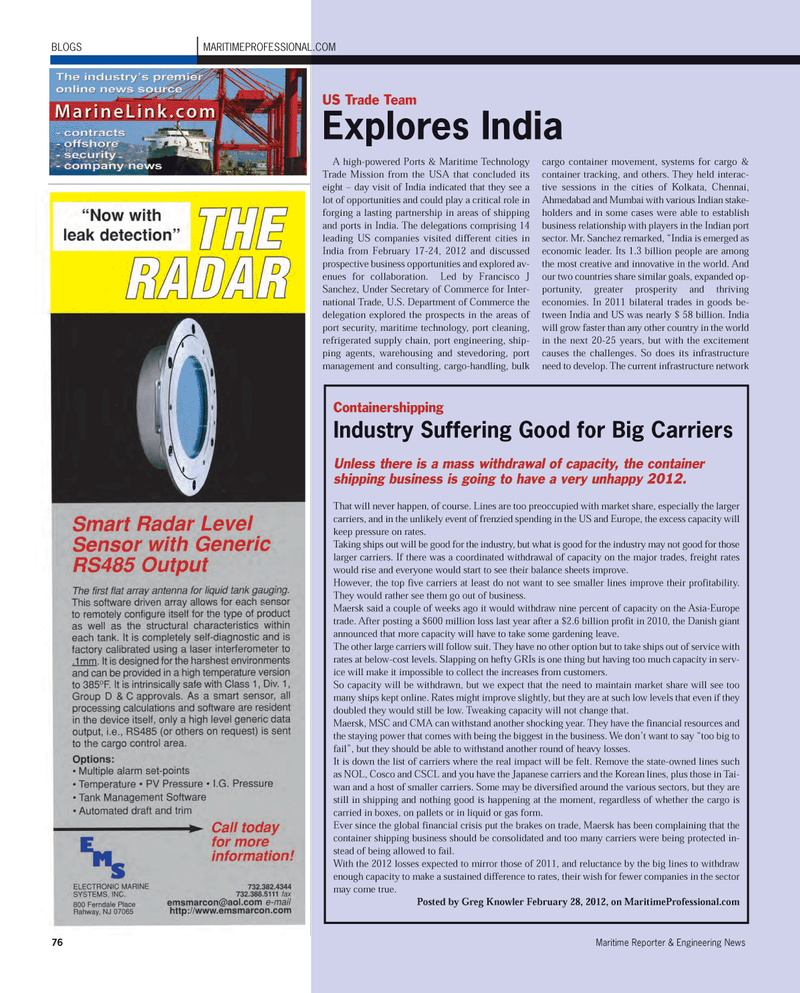
Page 76: of Maritime Reporter Magazine (March 2012)
The Ship Repair Edition
Read this page in Pdf, Flash or Html5 edition of March 2012 Maritime Reporter Magazine
76Maritime Reporter & Engineering News A high-powered Ports & Maritime Technology Trade Mission from the USA that concluded its eight ? day visit of India indicated that they see a lot of opportunities and could play a critical role inforging a lasting partnership in areas of shipping and ports in India. The delegations comprising 14 leading US companies visited different cities in India from February 17-24, 2012 and discussedprospective business opportunities and explored av- enues for collaboration. Led by Francisco JSanchez, Under Secretary of Commerce for Inter- national Trade, U.S. Department of Commerce the delegation explored the prospects in the areas of port security, maritime technology, port cleaning, refrigerated supply chain, port engineering, ship-ping agents, warehousing and stevedoring, port management and consulting, cargo-handling, bulk cargo container movement, systems for cargo & container tracking, and others. They held interac- tive sessions in the cities of Kolkata, Chennai, Ahmedabad and Mumbai with various Indian stake- holders and in some cases were able to establishbusiness relationship with players in the Indian port sector. Mr. Sanchez remarked, ?India is emerged as economic leader. Its 1.3 billion people are among the most creative and innovative in the world. And our two countries share similar goals, expanded op- portunity, greater prosperity and thriving economies. In 2011 bilateral trades in goods be-tween India and US was nearly $ 58 billion. India will grow faster than any other country in the world in the next 20-25 years, but with the excitement causes the challenges. So does its infrastructureneed to develop. The current infrastructure network US Trade Team Explores India BLOGSMARITIMEPROFESSIONAL.COMContainershippingIndustry Suffering Good for Big Carriers Unless there is a mass withdrawal of capacity, the container shipping business is going to have a very unhappy 2012.That will never happen, of course. Lines are too preoccupied with market share, especially the larger carriers, and in the unlikely event of frenzied spending in the US and Europe, the excess capacity will keep pressure on rates. Taking ships out will be good for the industry, but what is good for the industry may not good for those larger carriers. If there was a coordinated withdrawal of capacity on the major trades, freight rates would rise and everyone would start to see their balance sheets improve. However, the top five carriers at least do not want to see smaller lines improve their profitability. They would rather see them go out of business. Maersk said a couple of weeks ago it would withdraw nine percent of capacity on the Asia-Europe trade. After posting a $600 million loss last year after a $2.6 billion profit in 2010, the Danish giant announced that more capacity will have to take some gardening leave. The other large carriers will follow suit. They have no other option but to take ships out of service with rates at below-cost levels. Slapping on hefty GRIs is one thing but having too much capacity in serv- ice will make it impossible to collect the increases from customers. So capacity will be withdrawn, but we expect that the need to maintain market share will see too many ships kept online. Rates might improve slightly, but they are at such low levels that even if they doubled they would still be low. Tweaking capacity will not change that. Maersk, MSC and CMA can withstand another shocking year. They have the financial resources and the staying power that comes with being the biggest in the business. We don?t want to say ?too big to fail?, but they should be able to withstand another round of heavy losses. It is down the list of carriers where the real impact will be felt. Remove the state-owned lines such as NOL, Cosco and CSCL and you have the Japanese carriers and the Korean lines, plus those in Tai- wan and a host of smaller carriers. Some may be diversified around the various sectors, but they are still in shipping and nothing good is happening at the moment, regardless of whether the cargo is carried in boxes, on pallets or in liquid or gas form. Ever since the global financial crisis put the brakes on trade, Maersk has been complaining that the container shipping business should be consolidated and too many carriers were being protected in- stead of being allowed to fail. With the 2012 losses expected to mirror those of 2011, and reluctance by the big lines to withdraw enough capacity to make a sustained difference to rates, their wish for fewer companies in the sector may come true.Posted by Greg Knowler February 28, 2012, on MaritimeProfessional.com MR March 12 # 10 (73-80):MR Template 3/6/2012 8:50 AM Page 76

 75
75

 77
77
